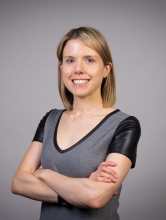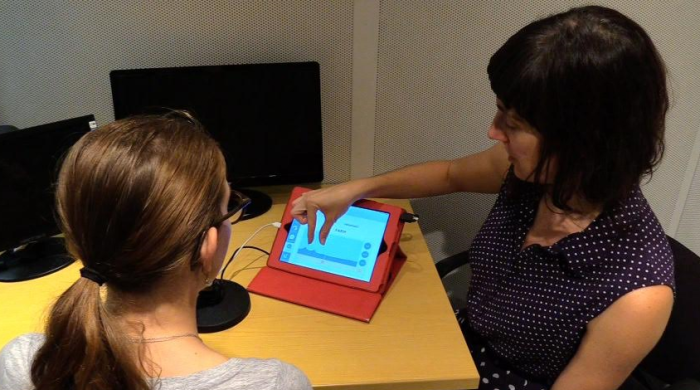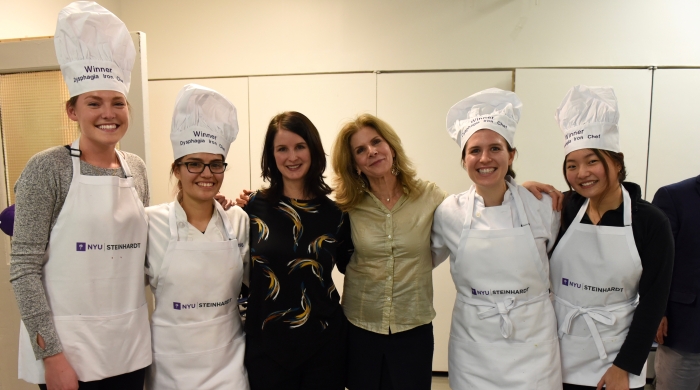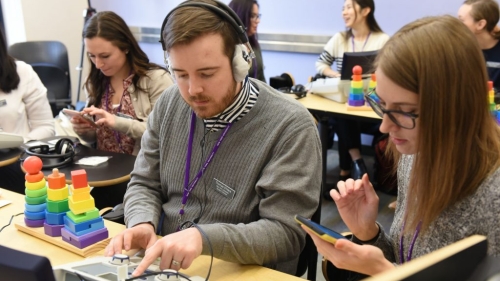Tara McAllister, associate professor and director of the doctoral program in Communicative Sciences and Disorders, has received two grants from the National Institutes of Health (NIH) to continue her research in the development and testing of biofeedback technology for use in speech-language pathology applications.
“Biofeedback-Enhanced Treatment for Sensorimotor Learning in Speech Sound Disorders” will provide $3 million in funding to assess the relative efficacy of biofeedback intervention for speech sound disorder when delivered in-person versus via telepractice, as well as evaluate whether treatment gains are better maintained when students practice at home using AI technology.
The NIH funding allows McAllister and her team to build on previous research on a free iOs app she developed called “staRt” in two new directions that will increase accessibility of speech therapy services – the first being delivery via telepractice, such as over Zoom.
“During the COVID-19 pandemic, we conducted a pilot study demonstrating that biofeedback treatment can be effective when delivered via telepractice,” says McAllister. “We are now following up on that work with larger-scale studies, and we are adapting the staRt software to work in a browser so it can be easily shared in a video call.”

The second new direction is using artificial intelligence (AI) to extend the services provided by the speech pathologist so clients can get more practice.
“Science has shown very clearly that a new speech skill needs to be practiced many times – one study suggested as many as 5,000 repetitions – before it becomes the new default for a speaker,” says McAllister. “Clinicians have jam-packed caseloads, which makes it very difficult to achieve those kinds of numbers with any given child, but we’re interested to see if similar results are seen in children who see their clinicians some of the time and complete AI-guided home practice on other days.”
Last year McAllister and her collaborators at Montclair State University and Syracuse University (notably Nina Benway, now a postdoctoral researcher at the University of Maryland) received NIH funding to develop a speech database that can train AI systems to classify children’s “r” sounds as on-target or off-target. The newly funded grant will support the team in integrating this classifier with the staRt app, so children’s home practice can be augmented with biofeedback and AI feedback on accuracy.
Again building off of previous research, McAllister’s second NIH grant, “Improving the Accessibility of Transgender Voice Training with Visual-acoustic Biofeedback,” will provide critical insight into how smartphone- or computer-based software can be used to help transgender people train their voices.
“Some trans people can be negatively impacted if their voice is perceived as incongruous with their gender identity, and they may choose to work with a speech pathologist to achieve a vocal presentation that is comfortable for them,” says McAllister. “In addition to the pitch of the voice, male and female vocal tracts also differ in their resonating characteristics, but resonance is harder to understand than pitch, and harder to target in therapy. The staRt software allows learners to visualize the resonant frequencies of the vocal tract, which could make it easier to adjust them to match a target that is appropriate for their personal speech goals.”
McAllister’s work is a collaboration with Vesna Novak, a transgender computer scientist at the University of Cincinnati. Their project will create and test the first software for gender-affirming voice training that combines real-time information about vocal pitch and resonance with structured exercises.
Related Articles
Helping People Communicate
Researchers in NYU Steinhardt’s Department of Communicative Sciences and Disorders are tackling high-impact treatment research in a variety of ways, using both innovation and technology to improve quality of life.
What Does an ‘R’ Sound Look Like?
A new speech therapy app helps kids facing persistent pronunciation challenges get "unstuck."
CSD and Nutrition Students Team Up for Iron Chef Competition
What do mashed potatoes, black bean soup, and coconut flan have in common? Not only are they foods easy for individuals with dysphagia, a swallowing disorder, to consume, but they are also dishes recently prepared by master’s students from the NYU Steinhardt Department of Communicative Sciences and Disorders and Department of Nutrition and Food Studies taking “Interdisciplinary Case-Based Management in Dysphagia.”




